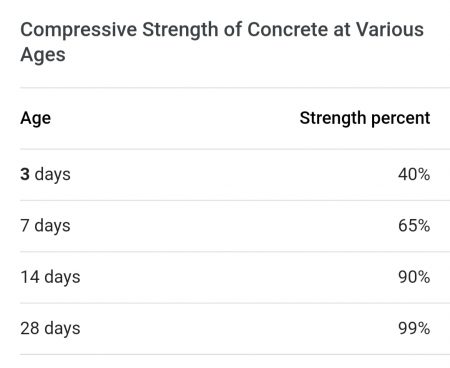Why cubes are tested at 3, 7 and 28 days for the Compressive Test?
Join TheConstructor to ask questions, answer questions, write articles, and connect with other people. When you join you get additional benefits.
Log in to TheConstructor to ask questions, answer people’s questions, write articles & connect with other people. When you join you get additional benefits.
Lost your password? Please enter your email address. You will receive a link and will create a new password via email.
Kuldeep Singh
First of all 28 days strength is the definition of compressive strength. So it’s obvious to test concrete on 28 days for strength. Concrete reaches 99% of its full potential strength in 28 days and 28 is also a round figure (4 weeks). Hence, it is chosen for the definition.
Now, 3, 7, and 14 day are both round figure in terms of percentage of strength development and also round figure in weeks. The reason for testing concrete before 28 days on these days as well is that suppose the concrete strength falls fairly inadequate on let’s say 7 or 14 days. Then, the concrete may straight away be discarded or another mix design be made. Or else, better curing can be done. This will save time, money and effort. That’s why generally three tests are done during the 28 day cycle.
The reason for testing concrete before 28 days on these days as well is that suppose the concrete strength falls fairly inadequate on let’s say 7 or 14 days. Then, the concrete may straight away be discarded or another mix design be made. Or else, better curing can be done. This will save time, money and effort. That’s why generally three tests are done during the 28 day cycle.
Getu B.
Concrete compressive tests are usually done at 1,3,7,14 and 28 days. Most important of these days (usually) is the 28th day strength, in which it is expected to gain 99% full strength. Early and intermediate results, i.e for 1,3,7,14 days, in which the concrete will gain its 16%,40%,65% and 90% strength respectively, are also important to predict the 28th day strength and to schedule our construction works ahead so that we will not wait until the concrete gains its full strength. For example, if the concrete test results fail at the 3 or 7 days we should take an action and we should not wait until the 28th day strength. There are also areas like post-pensioning works where we need intermediate results to schedule sequential stressing of tendons.
nikeetasharma
Cubes are tested at 3 , 7 and 28 days for the compressive test to gain more strength.